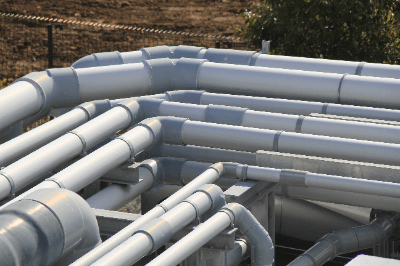What Is PVC Pipe?

PVC pipe, made of polyvinyl chloride resin, is also known as rigid PVC. This material boasts excellent water, weather, corrosion, and flame resistance, making it an economically advantageous alternative to metal pipes. Its lightweight and easy installation contribute to its widespread use. However, PVC pipes have lower resistance to organic solvents and heat. They are broadly divided into VP and VU pipes based on wall thickness.
VP pipes, with thicker walls, are used for water supply and ventilation, both indoors and outdoors. VU pipes are thinner and are commonly used for drainage systems and general housing ventilation.
Differences between PVC and Other General-Purpose Plastics
In addition to PVC, other general-purpose plastics include polystyrene, polyethylene, and polypropylene. PVC and polystyrene are amorphous, whereas polyethylene and polypropylene are crystalline. PVC, containing chlorine atoms in its structure, is chemically distinct from other plastics, leading to unique applications.
Uses of PVC Pipe
PVC pipes serve as water and sewer, ventilation, and protective pipes. Their weather and corrosion resistance make them ideal for long-term infrastructure use and ease of installation. Various types of PVC pipes, such as impact-resistant HIVP pipes and heat-resistant HT pipes, are used depending on the application. The availability of colorful PVC pipes at home centers has also increased their use as DIY materials.
Principles of PVC Pipe
There are four main types of PVC pipes, each suited for different purposes:
VP Pipe
VP pipes, with a pressure resistance of 1.0 MPa and a heat resistance of up to about 60 °C (140 °F), are used for indoor and outdoor drainage and water supply. They offer high smoothness and low friction, reducing the adherence of dirt and contaminants. However, they are sensitive to direct sunlight.
VU Pipe
VU pipes, thinner than VP pipes, have a pressure resistance of 0.8 MPa and are used for general household drainage systems due to their lightweight and suitability for low-pressure environments.
HIVP Pipe (Impact-Resistant Rigid Polyvinyl Chloride Pipe)
HIVP pipes are flexible and impact-resistant, with a pressure resistance of 1.0 MPa and a heat resistance of up to 50 °C. They are ideal for cold climates and areas subject to external impacts, such as earthquake-prone regions.
HT Pipe (Heat-Resistant Rigid Polyvinyl Chloride Pipe)
HT pipes are highly heat-resistant, suitable for temperatures up to nearly 90 °C, and are commonly used for hot water supply piping.